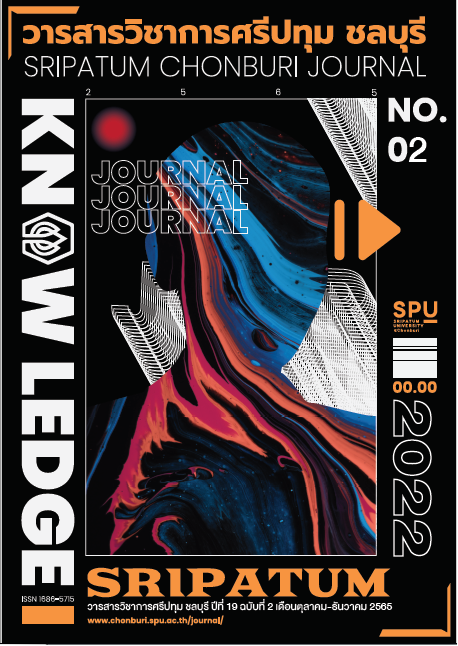รูปแบบการจัดการแนวใหม่ที่มีความสัมพันธ์ต่อการพัฒนาองค์กรในประเทศไทย ในยุค NEW NORMAL
รูปแบบการจัดการแนวใหม่ที่มีความสัมพันธ์ต่อการพัฒนาองค์กรในประเทศไทยในยุค NEW NORMAL
Keywords:
รูปแบบการจัดการแนวใหม่, การพัฒนาองค์กรในประเทศไทย, ยุคนิวนอร์มอลAbstract
บทความนี้มีคำถามเพื่อศึกษารูปแบบการจัดการแนวปฏิบัติใหม่ ซึ่งจะทำให้ประเทศไทยกลายเป็น New Normal และเพื่อศึกษารูปแบบการใช้ชีวิตของโครงสร้างพื้นฐานการทำงานของโครงสร้างพื้นฐานและรูปแบบการลงทุนที่จะไม่รองรับองค์กรในประเทศใน ยุค New Normal เป็นการวิจัยแบบบราซิลเลียนทั้งการวิจัย เชิงปริมาณผู้วิจัยเลือกกลุ่มตัวอย่างแบบเฉพาะเจาะจงที่ให้กับส่วน/ผู้จัดการแผนกจำนวน 95 คนทำการบำรุงรักษาที่เหลือเป็นเรย์ 5 ระดับมีค่าความสอดคล้องระหว่าง แซ่กับเนื้อหามีค่าเท่ากับ .95 และมีค่าความเที่ยงตรงเท่ากับ .82 และการวิจัยเชิงเปรียบเทียบคุณภาพที่ได้รับจากกลุ่มเป้าหมาย รวบรวมกลุ่มผู้จัดการฝ่ายขึ้นไปเพื่อรับกลุ่มตัวอย่างแบบเฉพาะเจาะจงจำนวน 13 คน ผลการวิจัยดังต่อไปนี้
ผลลัพธ์จากการวิจัยปริมาณจำนวนมากขึ้นตามปัจจัยพื้นฐานทั้ง 4 อันดับแรก ประกอบไปด้วย 1) ทรัพยากรที่ใช้ประโยชน์ได้ 2) ต้องใช้สเตชันการทำงาน 3) ส่วนประกอบของธุรกิจ 4) ทรัพยากรที่เหลือให้รูปแบบการจัดการแนวใหม่ในการดาวน์โหลด องค์กรระดับ New Normal ในการประเมินโดยมีค่าสัมประสิทธิ์สหมิตรพุคูณคูณเป็น0.260 คราวที่ติดตามเหตุการณ์รูปแบบการจัดการแนวปฏิบัติใหม่ New Normal ในที่ซึ่งจะได้รับเสมอ 0.068 ไม่เกินที่ระดับ .05 โดยมีค่าของความเป็นไปตามมาตรฐานในการพยากรณ์เท่ากับ 0.412
ผลการวิจัยเชิงคุณภาพพบว่า ปัจจัยที่ต้องทำต่อรูปแบบการจัดการแนวปฏิบัติที่จะช่วยให้องค์กรได้รับทราบภายใต้ New Normal ในมุมมองของกลุ่มเป้าหมาย มี 2 ปัจจัยประกอบ 1) รูปแบบการใช้ชีวิต และ 2 ) ด้านข้างจัดรูปแบบการทำงานโดยทั้ง 2 ปัจจัยนี้รวมถึงรูปแบบการจัดการแนวใหม่ ซึ่งรวมถึงองค์กรในประเทศสำหรับ New Normal
References
กริช แรงสูงเนิน. (2554). การวิเคราะห์ปัจจัยด้วย SPSS และ AMOS เพื่อการวิจัย. กรุงเทพฯ: ซีเอ็ด ยูเคชั่น.
กระทรวงสาธารณสุข. (2564). Alternative Quarantine (ในส่วนกทม. / ส่วนภูมิภาค) (ออนไลน์). เข้าถึงได้จาก: http://covid-
center.hss.moph.go.th [2563, 22 ธันวาคม].
ธีรวุฒิ เอกะกุล. (2543). ระเบียบวิธีวิจัยทางพฤติกรรมศาสตร์และสังคมศาสตร์. อุบลราชธานี: สถาบันราชภัฎอุบลราชธานี.
Alharbi, F. (2021). The Use of Digital Healthcare Platforms During the COVID-19 Pandemic: The Consumer Perspective. Acta
Informatica Medica, 29(1), p. 51.
Bodin Buddhain. (2021). “New normal” ในโลกหลัง COVID-19 ที่ไม่มีอะไรเหมือนเดิม (ออนไลน์). เข้าถึงได้จาก:
https://webportal.bangkok.go.th/citylaw/page/sub/18819/title/3/info/234380/%E2%80%9CNew-normal%E2%80%9D-%E0%B9%83%E0%B8%99%E0%B9%82%E0%B8%A5%E0%B8%81%E0%B8%AB%E0%B8%A5%E0%B8%B1%E0%B8%87-COVID-19-%E0%B8%97%E0%B8%B5%E0%B9%88%E0%B9%84%E0%B8%A1%E0%B9%88%E0%B8%A1%E0%B8%B5%E0%B8%AD%E0%B8%B0 %E0%B9%84%E0%B8%A3%E0%B9%80%E0%B8%AB%E0%B8%A1%E0%B8%B7%E0%B8%AD%E0%B8%99%E0%B9%80%E0%B8%94
%E0%B8%B4%E0%B8%A1 [2565, 10 กรกฎาคม].
Chen, Y., & Biswas, M. I. (2021). Turning Crisis into Opportunities: How a Firm Can Enrich Its Business Operations Using Artificial
Intelligence and Big Data During COVID-19. Sustainability, 13(22), p. 12656.
Cronbach, L. J. (1990). Essentials of Psychological Testing (5th ed.). New York, NY: Harper Collins.
Kronblad, C., & Pregmark, J. E. (2021). Responding to the COVID-19 Crisis: the Rapid Turn Toward Digital Business Models.
Journal of Science and Technology Policy Management.
Kosteas, V. D., Renna, F., & Scicchitano, S. (2022). Covid-19 and Working From Home: Toward a ‘New Normal’?.
Ivanov, D. (2021). Digital Supply Chain Management and Technology to Enhance Resilience by Building and Using End-to-End
Visibility During the COVID-19 Pandemic. IEEE Transactions on Engineering Management.
Janteng, J., & Tan, C. L. (2017, July). Effects of Value Co-Creation on Innovation Capability: Knowledge Sharing as a Moderator. In
ICICKM 2017 14th International Conference on Intellectual Capital Knowledge Management & Organisational Learning:
ICICKM, pp. 116-121.
Müller, J. M., & Däschle, S. (2018). Business Model Innovation of Industry 4.0 Solution Providers Towards Customer Process
Innovation. Processes, 6(12), p. 260.
Koumas, M., Dossou, P. E., & Didier, J. Y. (2021). Digital Transformation of Small and Medium Sized Enterprises Production
Manufacturing. Journal of Software Engineering and Applications, 14(12), pp. 607-630.
McMillan, T. T. (1971). The Delphi Technique. Paper Presented at Annual Meeting of California Junior. College Association
Commission on Research and Development,(3 May 1971) Monterrey California.
Munoz, A., Todres, M., & Rook, L. (2021). Empowering Organisations to Gain From Uncertainty: a Conceptualisation of
Antifragility Through Leveraging Organisational Routines in Uncertain Environments. Australasian Accounting, Business and
Finance Journal, 15(3), pp. 23-42.
Umar, M., Xu, Y., & Mirza, S. S. (2021). The Impact of Covid-19 on Gig Economy. Economic Research-Ekonomska Istraživanja,
(1), p. 22
Sa’diyah, N. K., & Enggarsasi, U. (2021). Social Structure as the Root of Improving Criminality in the Era of Pandemic Covid-19.
International Journal of Criminology and Sociology, 10, pp. 1202-1211.
Peñarroya-Farell, M., & Miralles, F. (2022). Business Model Adaptation to the COVID-19 Crisis: Strategic Response of the Spanish
Cultural and Creative Firms. Journal of Open Innovation: Technology, Market, and Complexity, 8(1), p. 39.
Galanti, T., Guidetti, G., Mazzei, E., Zappalà, S., & Toscano, F. (2021). Work From Home During the COVID-19 Outbreak: The
Impact on Employees’ Remote Work Productivity, Engagement, and Stress. Journal of Occupational and Environmental
Medicine, 63(7), p. e426.
Vargo, D., Zhu, L., Benwell, B., & Yan, Z. (2021). Digital Technology Use During COVID‐19 Pandemic: A Rapid Review. Human
Behavior and Emerging Technologies, 3(1), pp. 13-24.
Xing, W., Hsu, P. Y., Chang, Y. W., & Shiau, W. L. (2020). How does Online Doctor–Patient Interaction Affect Online Consultation
and Offline Medical Treatment?. Industrial Management & Data Systems.
Yang, L., & et al,. (2022). The Effects of Remote Work on Collaboration Among Information Workers. Nature Human Behaviour,
(1), pp. 43-54.
Downloads
Published
Issue
Section
License
Copyright (c) 2022 วารสารวิชาการศรีปทุม ชลบุรี Sripatum Chonburi Journal

This work is licensed under a Creative Commons Attribution-NonCommercial-NoDerivatives 4.0 International License.
บทความทุกบทความเป็นลิขสิทธิ์ของวารสารวิชาการศรีปทุม ชลบุรี



